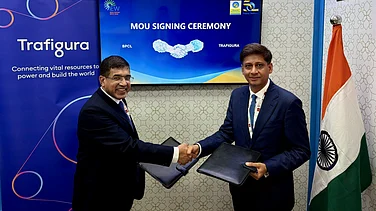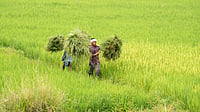India’s plastic waste management system heavily relies on informal sector collectors, who recover nearly 60% of discarded plastics. However, over 80% of these recovered plastics are typically downcycled into low-value applications due to inadequate recycling infrastructure.
With the Extended Producer Responsibility (EPR) law coming into effect from FY25–26 mandating the use of recycled plastics in packaging-brands now require consistent, high-quality recycled plastics to meet compliance and sustainability goals.
“There are four compelling reasons to opt for a circular economy, and Banyan Nation is leading the way.” says Mani.
This is where Banyan Nation steps in.
A pioneer in HDPE recycling, Banyan Nation has recycled over 2 billion bottles, returning them to store shelves as high-quality packaging. An award-winning, vertically integrated recycling company, it was founded by Ivy League alumni Mani Vajipey and Rajkiran Madangopal, who returned to India in 2011 with a bold dream.
As Mani puts it, “If recycling were an Olympic sport, India would win the gold medal.”
Why do they believe this?
“There are four compelling reasons to opt for a circular economy, and Banyan Nation is leading the way.” says Mani.
Growing Consumption
India’s waste generation per capita is still relatively low-400 grams per day, compared to 2 kilograms in developed countries (Source: Mint). But total waste generation is only expected to rise, and we must be ready. Banyan Nation is scaling operations from 15,000 TPA to 50,000 TPA to meet this growing demand.
Innovation and Atmanirbharta
Plastic is derived from crude oil-80% of which India imports-increasing our dependency. A circular system for plastic packaging can make us more self-reliant, or ‘Atmanirbhar’. Our clients-Unilever, Reckitt, IFB, Shell, among others - are recognizing the value of recycled packaging that is USFDA-approved and human-contact-safe. At Banyan Nation, we also integrate cutting-edge AI technology into our processes to meet global quality standards and appeal to international markets.
Ever-Changing Supply Chains
The composition of waste has evolved from predominantly wet waste to increasing volumes of plastic, paper, glass, and metals. Even within plastics, not all packaging is recyclable. It must be collected, sorted, and managed at scale—a challenge Banyan Nation is solving.
We’ve mapped over 10,000 informal waste collectors and trained them to identify and sort materials to improve supply chain efficiency. Since 70% of India’s plastic waste comes from flexible packaging, we’re now expanding into this segment to create a broader industry impact.
Carbon Footprint and Sustainability
Reducing our carbon footprint is critical-not only for climate change mitigation but also for the health of future generations. A circular economy represents a ₹3.5 trillion business opportunity for India. Sustainability is now core to every business, and collaboration is key.

Banyan Nation is committed to this mission. With the support of government policies and the EPR mandate, we are well on our way to building a more sustainable India.

























